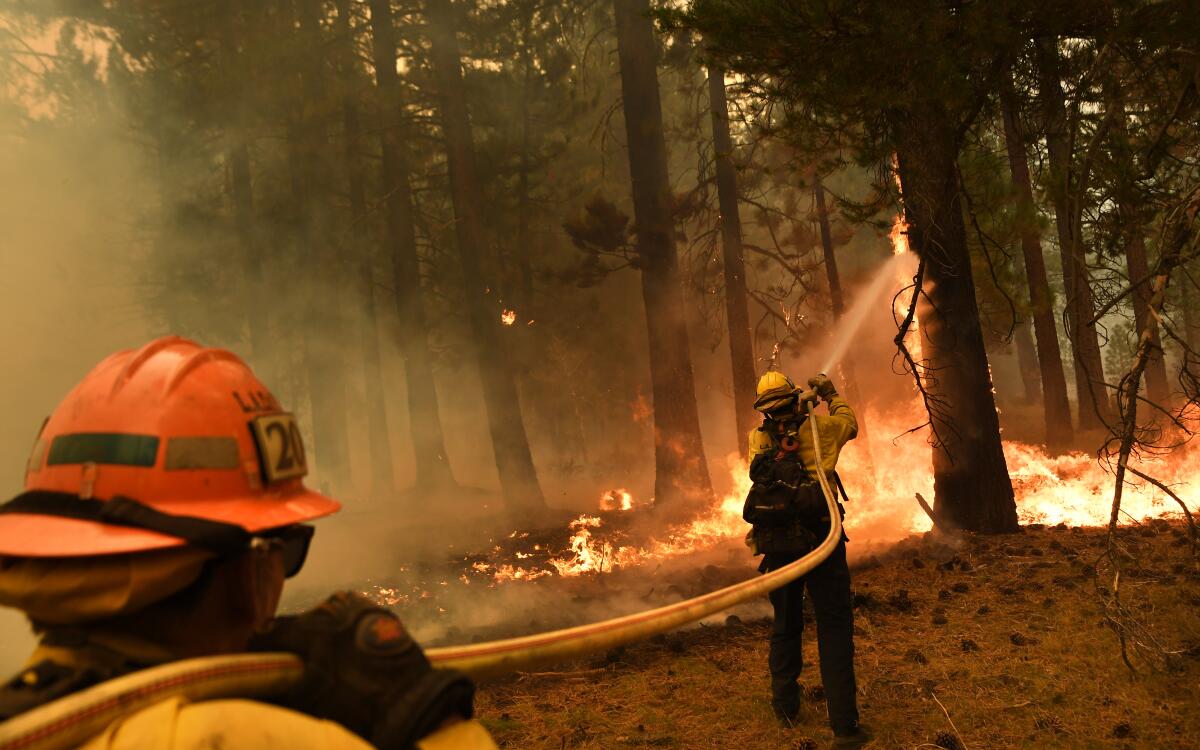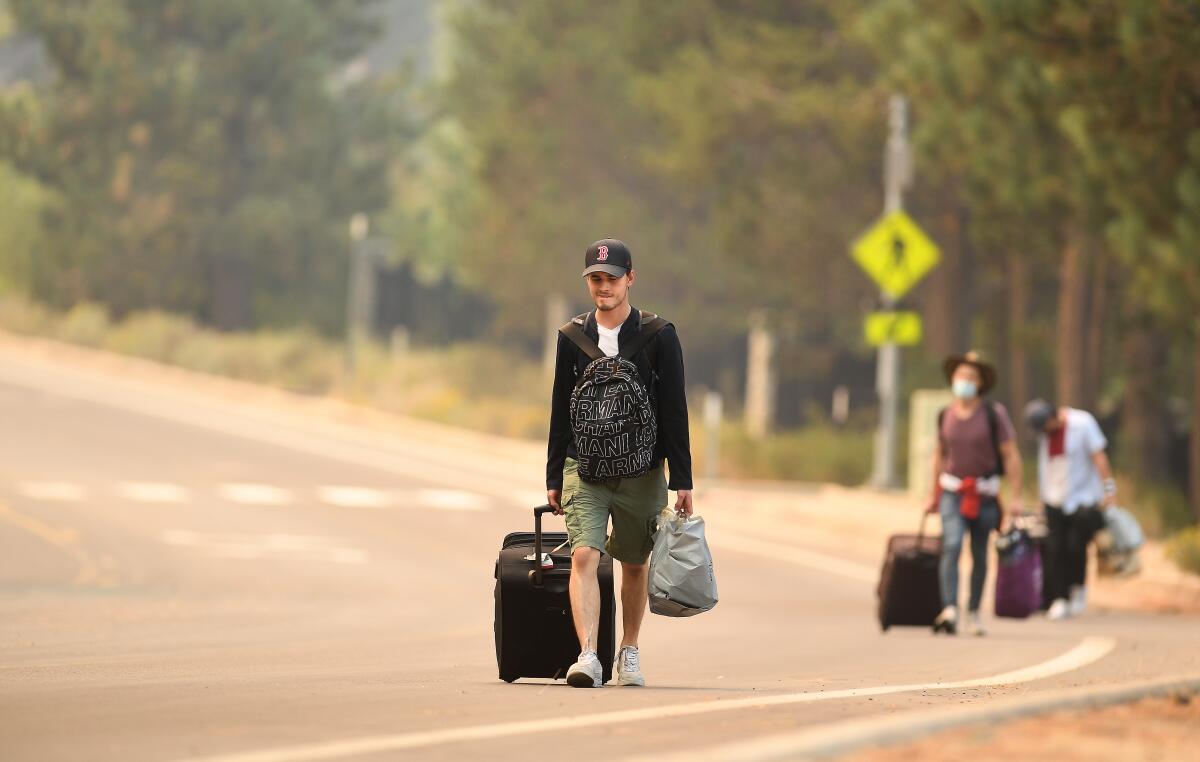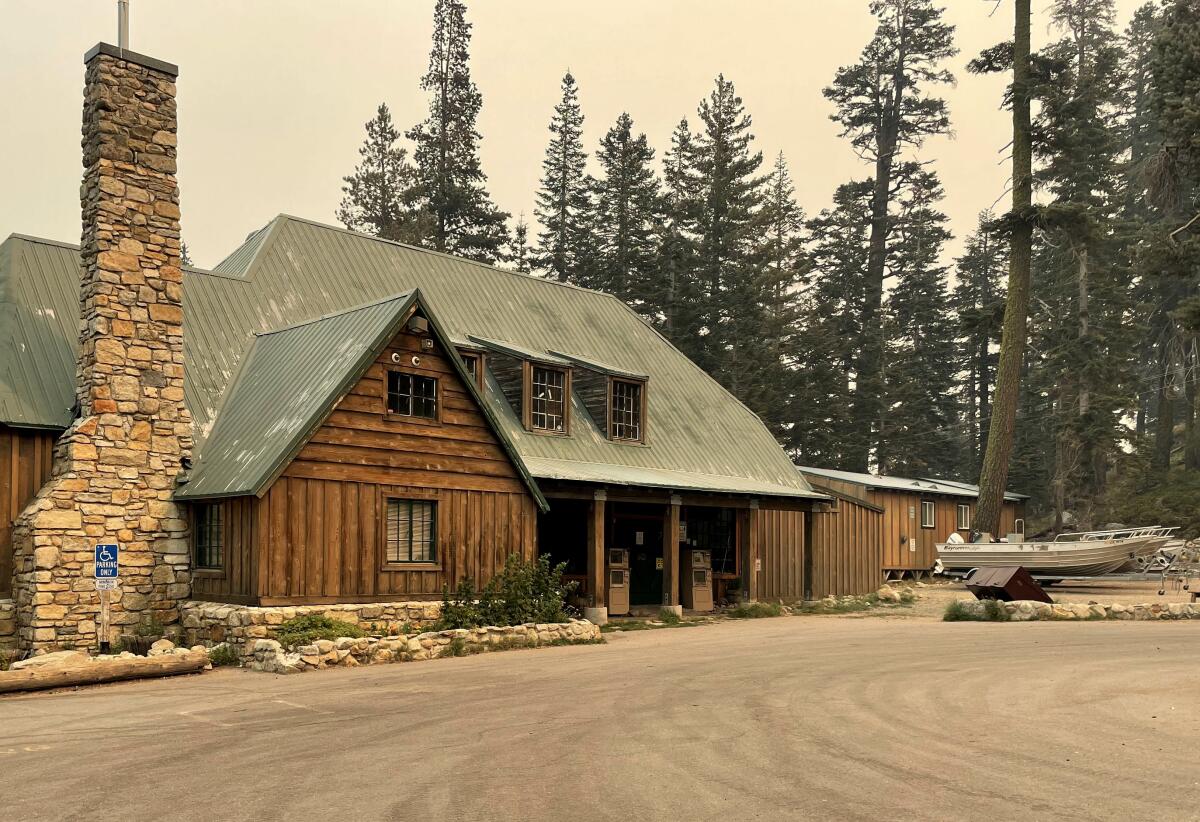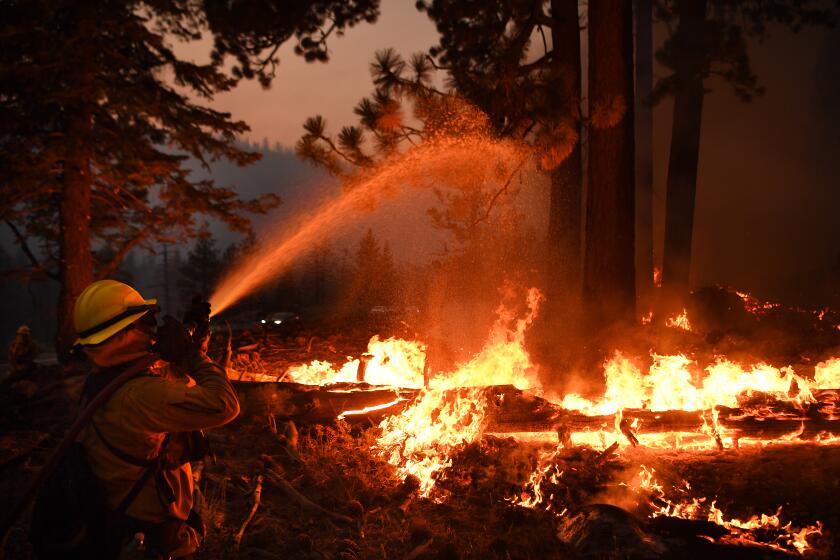An epic battle to save South Lake Tahoe as Caldor fire rages toward Nevada

- Share via
SOUTH LAKE TAHOE, Calif. — Fueled by heavy overnight winds, the massive Caldor fire has skirted a tall granite ridge that many Lake Tahoe residents hoped would shield them from harm and, by Tuesday evening, was posing a threat to thousands of homes in heavily forested neighborhoods to the south and east of the iconic shoreline.
The erratic winds and complicated topography kept fire officials guessing where the fire would go next. By late afternoon, the front appeared to have bypassed — for the moment — the more densely populated areas on the south shore and was moving northeast to the Nevada side of the lake.
Firefighters managed to save homes in Meyers and Christmas Valley and were amassing along Pioneer Trail and farther south in the ski town of Kirkwood, where another finger of the fire was pointed.
“We knew this was coming,” said Dave Lauchner, spokesman for the incident management team and a battalion chief with the Sacramento Fire Department. “The problem is it’s not one direction. It comes from the canyons in all directions.”
Thousands rushed to leave South Lake Tahoe as the resort city came under an evacuation order due to the Caldor fire.
Like many here, he expected the fire to peter out in the high reaches of the mountains where vegetation is sparser. He said his parents own a cabin two miles from the command post, and that just a few days ago he assured his mother that the fire could never reach this far.
“This fire does stuff I’ve never seen before,” he said.
Cal Fire chief Thom Porter noted that the Caldor fire and the nearby Dixie fire are the first in modern history to burn from one side of the Sierra to the other. The Dixie fire is the second largest in California history, having torn through 807,000 acres since July. The Caldor fire started Aug. 14 and as of Wednesday morning had burned 204,000 acres.

On Tuesday, much of the focus was within that perimeter along Highway 50, where structures had survived but were still threatened. “There’s a lot of pockets of unburned islands that are burning [now] that are still closing in on cabins in there,” said Eric Schwab, Cal Fire’s operation sections chief, in a community meeting Tuesday evening.
Jim Dudley, the incident meteorologist, said red flag conditions of high winds and low humidity will continue through Wednesday. “We got to get through tonight and tomorrow,” he said. “Things look better Thursday.”
That felt like a long way off in places where the gusts bore down and embers raked through bone-dry trees — places like Echo Lake.
The Alpine hideaway is a beloved destination for generations of hikers, fishers, backpackers, and a tight knit century-old community of seasonal cabins. Most are accessed only by boat, with the general store’s water taxi serving visitors and hikers. There is no electricity for most and no running water, yet the lucky few who have access to them speak of the lake in reverential terms.
The fire whipped through on Monday night, jumping through the crowns of the pine trees and becoming so intense firefighters pulled out, said Lauchner. Tuesday morning, trees were still aflame and a flank of the fire was moving largely unchecked into the Desolation Wilderness.
With the fire moving on so many fronts, crews had to prioritize structures that could be accessed by road.

That left the work of saving the Echo Lake cabins to two locals: Loren Sperber and Josh Birnbaum. Both men grew up here and can name the owners of nearly every cabin. Sperber is an off-duty fire captain. Birnbaum is a retired fire captain from Santa Cruz. They worked at the chalet as kids. On Sunday night, they came in alone and took a boat out to the cabins, defending them with all they had — shovels, rakes, saws.
So far, Sperber said Tuesday afternoon, none of those cabins ringing the lake had been lost. But the fire still threatened structures from the ridge above. The men were headed back out, dirty, weary, determined. “We’ve seen a lot more intense and threatening situations,” said Sperber of his time as a firefighter. “But having this be the most special place to many of us makes it unreal.”
Birnbaum shook his head. “Surreal,” he said, looking at the layer of smoke that obscured the lake’s famously clear waters.
Just down the windy road, South Lake Tahoe was evacuated on Monday and was dead quiet as ash whorled through smoke like snow flakes would in a winter fog. Jason Pope was one of the few holdouts, stuck behind because of a balky car and a cat and dog he was house-sitting.
“My little car won’t make it down the hill” he said, gesturing at a 2006 Subaru. He had just reached the friend whose house he was watching. The owner offered him use of their newer Subaru wagon to get the pets out, but Pope wasn’t too worried. He had turned his sprinklers on and figured, in the rare event the fire reached his property, it would hit a “mud puddle.”
The evacuation panic now jumped the state line to the Kingsbury, Nev. area, where Douglas County sheriff’s deputies knocked on doors telling people to get out.
Ryan Guest was filling his red 4runner with clothes packed in garbage bags and bins as he prepared to leave a three-story brown wood apartment complex. He had only returned from Cabo San Lucas a few weeks ago but was now heading back on the road to San Diego where he has family.
“It’s not worth it,” he said of the risk of staying. Next to him, loading up his jeep Cherokee, Jason Kingsbury agreed. He was headed to Reno to see if he could find a room, though the convention center there has been opened as a shelter because there are so many evacuees.
He knew of people ignoring the evacuation orders, but he was leaving for his own peace of mind. “It just makes sense. If it burns it’s gone. I’ve got insurance.”
Down the mountain at the Douglas County Community Center in Gardnerville, Nev., Rick and Lee Wright watched the ash float down from a yellow sky.
They had been taking care of their 2-year-old granddaughter Sunday night at their home south of Lake Tahoe on Sunday night, when they decided it was time to go, the first time they’d ever had to evacuate.
“I didn’t think it could happen,” said Rick Wright, 60. “I thought they would throw an army in there to stop it from getting to Tahoe, but it became real Sunday night, you know?”
They set up tents they bought just months ago to go camping.
“We’re doing it now,” he said, chuckling. “We’re camping.”
Phoenix Hunter, 53, also a ski instructor, said she began to worry about the fire when she learned that the ski resort she works for, Sierra-at-Tahoe resort, had called in a hotshot crew to protect the property.
“I had my antenna up,” she said. She said the resort used snow blowing guns to spray water on the property. She left late Monday morning with her 15-year-old daughter, two dogs and a rabbit named Butterscotch.
“I try to look at the bright side that I’m alive and not in the bullseye of the fire,” she said.
More to Read
Sign up for Essential California
The most important California stories and recommendations in your inbox every morning.
You may occasionally receive promotional content from the Los Angeles Times.














